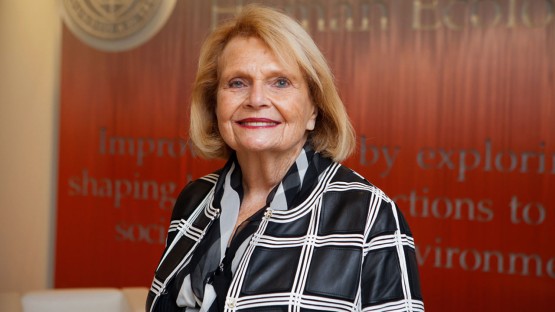
A foundational gift has endowed and named the Joan Klein Jacobs Center for Precision Nutrition and Health in the College of Human Ecology (CHE), expanding Cornell’s portfolio of research and programs in the emerging field of precision nutrition.
A gift totaling $25 million from Irwin M. Jacobs ’54, BEE ’56 and the Jacobs family includes a new $15 million commitment, adding to a $10 million commitment in 2023 that helped establish the center. The naming honors Joan Klein Jacobs ’54, a devoted Cornell Human Ecology alumna and lifelong advocate for nutrition and health who died in May at the age of 91.
“Joan was always passionate about the health and well-being of others, and this center is a fitting tribute to her legacy,” Irwin Jacobs said. “Our family believes that the work being done at Cornell in precision nutrition will have a significant global impact, and we are honored to support this critical research.”
The gift will endow core support and discretionary resources for the new Human Ecology center, including funding for postdoctoral fellowships, faculty innovation grants, experiential learning funds for students and other opportunities to enhance interdisciplinary expertise and collaboration across Cornell’s Ithaca, Cornell Tech and Weill Cornell Medicine campuses.
“This inspiring gift in honor of Joan will enhance Cornell’s long-standing renown in nutritional sciences,” said Interim President Michael I. Kotlikoff. “This funding will accelerate research in a critical and underfunded area, invest in the next generation of exceptional scientists working on the science of nutrition, and expose students to a field with ever-increasing importance to human health.”
The vision for the new center was conceived in 2021 by Rachel Dunifon, the Rebecca Q. and James C. Morgan Dean of the College of Human Ecology; and Dr. Saurabh Mehta, the Janet and Gordon Lankton Professor, and Patricia Cassano, the Alan D. Mathios Professor, both faculty in the Division of Nutritional Sciences, which is shared by CHE and the College of Agricultural Life Sciences. Since then, CHE has received two grants from the National Institutes of Health to support the effort: in 2022, to co-lead the research coordinating center for the agency’s $190 million Nutrition for Precision Health study, and in 2023, a $1.7 million grant to develop a training program that combines precision nutrition with advanced data science and analytical methods.
“Precision nutrition allows us to move beyond one-size-fits-all approaches to nutrition and health by developing targeted dietary guidance that meets individual needs,” Dunifon said. “With the Joan Klein Jacobs Center, we have the potential to revolutionize nutritional sciences by providing more effective interventions that can prevent and manage diseases, reduce health disparities, and ultimately improve health outcomes on a global scale.”
Leveraging Cornell’s strengths in artificial intelligence and technology innovation, the center aims to connect individual-level nutrition guidance to population-level policies, and bridge academic research to create practical applications. These discoveries will inform preventative treatments for a range of health conditions, from autoimmune and neurologic diseases to infections, cancer and diabetes.
“Malnutrition is an existential threat to human health and is the leading risk factor for chronic diseases and premature death in the US and globally,” said Mehta, the center’s founding director. “Novel approaches are urgently needed to address this intractable problem, particularly for low-resource settings. This investment will enable the Joan Klein Jacobs Center to bring together nutrition, artificial intelligence and technology at Cornell and translate innovations through the last mile to transform population nutrition and health.”
Joan Jacobs was an advocate for Human Ecology and Cornell and a leading university benefactor for decades. With her husband Irwin Jacobs – founding chairman and CEO emeritus of Qualcomm – she made several transformative gifts to advance Cornell’s teaching, research and impact through the establishment of endowments for scholarships, fellowships and professorships in CHE and Cornell Engineering. The couple’s largest commitment to Cornell, $133 million in 2013, created the Joan and Irwin Jacobs Technion-Cornell Institute at Cornell Tech.
Dunifon said this gift honors Joan Jacobs’ legacy of empathy, curiosity, vision and commitment to bettering the health and well-being of people everywhere.
“The Jacobs Center will serve as a beacon of her values at Cornell,” she said, “driving forward research that will transform the landscape of nutritional sciences and improve countless lives.”
Robin Roger is the assistant dean for communications in the College of Human Ecology.
